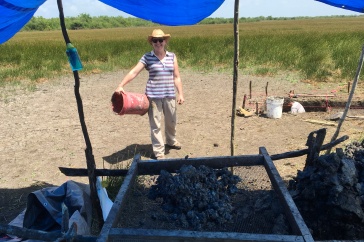Rising seas pose significant risks to New Hampshire coastal communities and ecosystems, cultural resources and the Portsmouth Naval Shipyard, and climate change-driven health impacts threaten to affect Granite State and New England residents who are vulnerable to rising temperatures, more precipitation and severe weather events.
The findings come from two new reports out of UNH's Climate Solutions New England (CSNE)—"Sea-level Rise, Storm Surges, and Extreme Precipitation in Coastal New Hampshire" and "Climate Change and Human Health in New Hampshire," both of which also provide insight into how society can address these challenges, including a commitment to the reduction of heat-trapping greenhouse gases.
"New Hampshire's climate is already changing and having an impact on people's lives," says Cameron Wake, UNH research professor and coauthor of the reports. "It's hotter and wetter, there are more extreme precipitation events, our sea levels are rising and our health is being affected."
The specific impacts cited in the human health report include heat-related morbidity and mortality, respiratory illness, allergies, insect-borne, food- and water-borne, diseases, health behaviors and chronic disease and mental health or stress-related disorders, which can greatly increase medical costs.
Among other consequences, higher sea levels will mean higher storm surges, which occur primarily during nor'easters and hurricanes, resulting in flooding over greater coastal land area. The flooding caused by storm surge will also take longer to abate than in the past.
The two reports build upon previous CSNE analyses that, together, provide a scientific foundation for how best to plan for and adapt to our changing climate. "What we need to do now is build community resilience to deal with these changes," Wake says.
Building community resilience in the face of climate change involves how the built environment is planned, including land use, transportation, buildings and water management decisions, as well as how we interact with our natural environment and preserve its life-supporting functions. In public health, resilience is a measure of a community's ability to use available resources to respond to, withstand and recover from adverse situations.
Indeed, the reports stress that a resilience-based approach to climate change adaptation should align with preexistingplans and strategies rather than reinvent the wheel, and needs to integrate the understanding that climate is already changing into decision-making processes at many different levels, e.g., business, state and municipal government.
For example, with respect to human health concerns, such an approach underscores the importance of "cross-sector collaboration and coordinated strategies to address the social and environmental determinants of health." Such strategies not only support healthy communities for all New Hampshire residents but also are critically important for reducing health care costs and reducing the burden of disease.
Finally, the reports note that the single most effective adaptation strategy is mitigation of climate change through the reduction of emissions of heat-trapping gases.
Committing to a reduction of greenhouse gas emissions now will reduce the amount of climate change society will have to adapt to. In tandem with that, we will have to determine how to deal with the change we've already committed to because of the inertia of the climate system and the long lifetime of greenhouse gases in the atmosphere.
The research for the climate change and human health report was funded by the NH Department of Health and Human Services through a collaboration with the Centers for Disease Control in Atlanta. CSNE is a UNH initiative led by the UNH Sustainability Institute.
To view the CSNE reports, as well as a Sustainability Institute Briefing that summarizes the key findings from all previous analyses, visit http://www.climatesolutionsne.org
-
Written By:
Staff writer | Communications and Public Affairs
















































